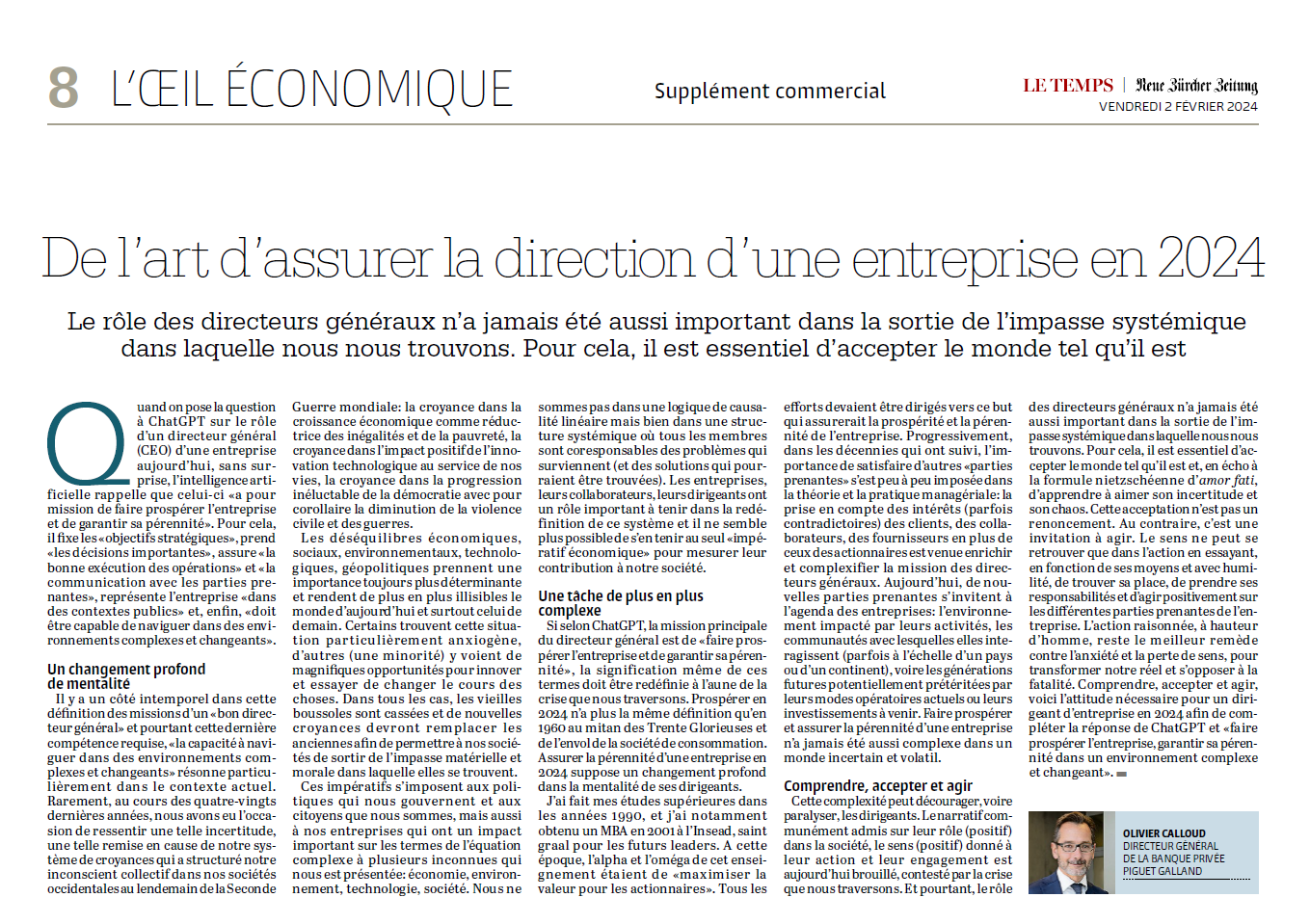
This article was written by Olivier Calloud, CEO. It is extracted from the magazine "L'œil économique published in Le Temps" (written in French) on February 2, 2024.
The role of chief executives has never been more critical in overcoming the systemic deadlock. The key is to accept the world as it is.
When ChatGPT was asked to describe the role of a company's Chief Executive Officer (CEO), it came as no surprise to learn that the CEO's "mission is to make the company prosper and ensure its long-term activity". To do this, they set "strategic objectives", make "key decisions", ensure "proper execution of operations" and "communication with stakeholders", represent the company "in public contexts", and, finally, "must be able to navigate complex and changing environments".
A profound change in mentality
There is something timeless about this definition of the tasks of a "good CEO." Yet, the last skill required—"the ability to navigate complex and changing environments"—resonates particularly well in today's context. Rarely in the past eighty years have we had the chance to face such uncertainty, such a challenge to the belief system that has shaped our collective unconscious in Western societies since the aftermath of the Second World War: the belief in economic growth as a means to reduce inequality and poverty, the belief in the beneficial impact of technological innovation on our lives, the belief in the steady progress of democracy with its resulting decrease in civil violence and war.
Economic, social, environmental, technological, and geopolitical imbalances are taking on ever greater significance, making today's world, and all the more so tomorrow's, increasingly inscrutable. Some individuals find this situation particularly troubling, while others (a minority) view it as a splendid opportunity to innovate and to attempt to alter the course of events. Regardless of the perspective, the old compasses are shattered, and new beliefs must supplant the old ones if our societies are to break free from the material and moral deadlocks in which they are trapped.
These imperatives pertain to the politicians who lead us and to us as citizens and our businesses, which significantly influence the terms of the intricate equation with numerous unknowns: economy, environment, technology, and society. We are not contending with a straightforward causal logic but with a systemic framework in which all participants are collectively accountable for the problems that emerge (and the resolutions that may be discovered). Companies, their staff, and their managers play a crucial role in reshaping this system, and it no longer seems feasible to gauge their contribution to our society purely based on the "economic imperative".
An increasingly complex task
If, according to ChatGPT, the CEO's primary mission is "to make the company thrive and ensure its ongoing viability," the true meaning of these terms must be reconceived in light of the crisis we are experiencing. Thriving in 2024 does not carry the same connotation as in 1960, during the height of the Thirty Glorious Years and the emergence of the consumer society. Guaranteeing the future endurance of a corporation in 2024 necessitates a significant shift in the mindset of its executives.
My advanced education was in the 1990s, including an MBA in 2001 from Insead, the revered institution for aspiring leaders. At that juncture, the ultimate goal of such education was "maximizing shareholder value." Every endeavour was to be aimed at this target, which promised the prosperity and continuity of the business. However, as time progressed, the significance of attending to other 'stakeholders' grew to become a fundamental component of management ideology and practice: considering the (sometimes divergent) interests of clients, workers, and suppliers, in conjunction with those of shareholders, has broadened and complicated the duties of CEOs.
New stakeholders assert their influence on company agendas: the environment affected by their activities, the communities they engage with (sometimes on a national or continental level), and even future generations whom their present business practices or investments may impact. Securing a business's prosperity and endurance has become intricate in uncertainty and instability.
Understanding, accepting, and taking action
This complexity can dishearten or even immobilize managers. The widely accepted narrative about their (positive) function in society, the (positive) significance attributed to their deeds and their dedication, is now muddled and questioned by the crisis we are facing. Nonetheless, the role of Chief Executives has never been more essential in navigating the systemic stalemate in which we find ourselves. To do so, it is crucial to accept the world and, mirroring Nietzsche's concept of amor fati, learn to appreciate its uncertainty and disorder. This acceptance is not capitulation. Instead, it is a catalyst for action. Meaning is solely derived from endeavouring, within one's capacity and with modesty, to locate one's position, shoulder one's responsibilities, and constructively impact the company's array of stakeholders. On a human scale, deliberate action continues to be the most effective countermeasure against apprehension and the diminishment of purpose to alter our reality and challenge fate. Understanding, accepting, and action are the qualities necessary for a company executive in 2024 to supplement ChatGPT's response and "enable the company to thrive, ensuring its persistence in a complex and evolving context."







